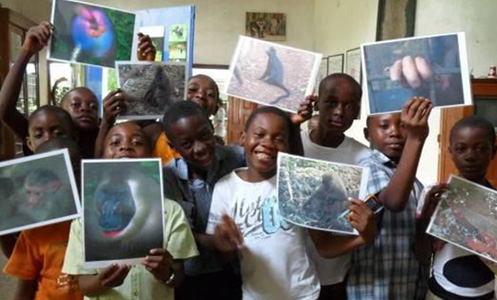ACT - Volume 9 Issue 1
<<< Back to Table of Contents
Conservation in the Schools of Cameroon
By Israel Bionyi
Cameroon’s literacy mission and success in the education sector has spurred economic growth for West Africa at large. It is among the richest countries in the continent in terms of biodiversity and natural resources. Naturally, Cameroon shines in conservation education at different levels, and this is the key to unlock young minds to the impacts of deforestation and climate change on biodiversity. That said, out of 10,000 students graduating from Cameroonian universities every year, less than 5% qualify in conservation science. This calls for some introspection.
 |
Students at the Limbe Wildlife Centre (LWC) in Cameroon. Photo credit: LWC
|
There are 38 universities in Cameroon, of which 8 are State owned. Not only are the State universities rated highly, but also they have either a school or department of science that offers environmental and conservation studies. Animal biology, zoology, environmental studies and earth science are among the more popular programs. Of the 30 private Universities in Cameroon, 5 offer environmental or conservation studies viz., The Higher Institute of Environmental Sciences (HIES); Pan African University of West Africa-Environment and Agricultural development (MSc); Catholic University of Central Africa-Geography and Environmental Studies; Bamenda University of Science and Technology; and Environment and Rural Development Foundation Environmental Programme (ERUDEF).
The Ministries of Forestry & Wildlife and Environment are tasked with running 2 schools; The National School of Waters and Forests (NSWF) and the Institute of Faune (IoF) in Garoua. These schools train managers, experts, guards, and administrators. Flavien Ngibaot is a graduate of NSWF and brigade commander for forestry control operations in the Ministry of Forestry and Wildlife. He is the man behind the fight against illegal felling of the Bibinga tree and the campaign against wildlife poaching in the littoral region. Under his leadership the ministry has saved thousands of wild animals, seized guns and fined itinerant logging companies. The Ministries also support environmental campaigns by magazines every year. Examples include “Les defenseurs de L’environnement” (The Defenders of the Environment), “Le Selviculteur” (The Forester) Magazine, and “Lettre Verte” (The Green Letter) produced by the Ministry of Forestry and Wildlife.
A number of NGOs promote conservation education in Cameroon. They conduct awareness campaigns; competitions and events in primary, secondary and tertiary schools, sponsor youth magazines and offer conservation books to libraries, scholarships and train students in field conservation projects. WWF Central Africa Program has done yeoman service for conservation education in Cameroon. They have offered 10 Cameroonians international internships and 4 higher education scholarships since 2011. A synergy between NGOs and the government could make Cameroon a hub of conservation education in West Africa.
Israel Bionyi is the Assistant Editor of ACT and a Communications Specialist, Douala, Cameroon.
